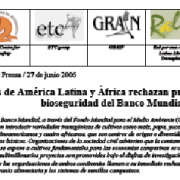Monsanto anuncia la compra de Delta & Pine Land y Terminator
Enviado por ETC Staff el
Siguiendo con la expansión de su imperio corporativo en semillas —Monsanto, la empresa semillera más grande del mundo—anunció ayer que adquirirá por 1500 millones de dólares la mayor empresa de semillas de algodón del globo, Delta & Pine Land, basada en Mississippi (Estados Unidos). Juntos, Monsanto y Delta & Pine Land (D&PL) controlan más del 57% del mercado de semillas de Estados Unidos. Con las subsidiarias de D&PL en 13 países —incluyendo grandes mercados como China, India, Brasil, México, Turquía y Paquistán— esta operación significa que Monsanto tendrá una posición dominante en una de las commodities más importantes del comercio agrícola, y que millones de agricultores de algodón sufrirán una mayor presión para que aceptar semillas de algodón transgénico.
Monsanto prend le contrôle de Delta & Pine Land et de la technologie des semences Terminator
Enviado por ETC Staff el
Dans sa quête d’un empire toujours plus vaste, Monsanto – la plus grosse semencière au monde – a annoncé hier son intention d’acheter pour 1,5 milliard $US la firme Delta & Pine Land, numéro un mondial des semences de coton établie dans le Mississipi (É.-U.). Ensemble, Monsanto et Delta & Pine Land (D&PL) contrôlent plus de 57 % du marché des semences de coton aux É.-U. D&PL a des filiales dans 13 pays, dont certains grands marchés du coton – Chine, Inde, Brésil, Turquie, Pakistan. Cette prise de contrôle assure à Monsanto une position dominante dans le commerce de l’un des produits agricoles majeurs dans le monde.Cela veut aussi dire que des millions d’agriculteurs seront soumis à des pressions encore plus importantes pour adopter les semences de coton génétiquement modifiées (GM).
Monsanto Acquires Delta & Pine Land and Terminator
Enviado por ETC Staff el
In a quest to expand its corporate seed empire - Monsanto, the world's largest seed enterprise - announced yesterday that it will buy the world's leading cotton seed company, Mississippi-based (USA) Delta & Pine Land, for US$1.5 billion. Monsanto and Delta & Pine Land (D&PL) together account for over 57% of the US cotton seed market. With D&PL subsidiaries in 13 countries - including major markets such as China, India, Brazil, Mexico, Turkey and Pakistan - the takeover means that Monsanto will command a dominant position in one of the world's most important agricultural trade commodities and that millions of cotton farmers will be under increased pressure to accept genetically modified (GM) cottonseed.
Groups in Latin America and Africa call for rejection of World Bank-GEF biosafety projects
Enviado por ETC Staff el
Two World Bank projects, with funding from the GEF (Global Environmental Facility), propose to introduce genetically modified crops such as maize, potatoes, cassava, rice and cotton into five Latin American and four African countries that are centers of origin or diversity for these and other major food crops. Civil society organizations warn that DNA contamination from genetically modified crops poses an unacceptable risk to stable crops that are the basis of peasant economies in these regions. The multi-million dollar projects are being promoted under the guise of scientific biosafety research, but civil society organizations on both continents are calling for their immediate rejection because they threaten food sovereignty and farmer-controlled seed systems.
Grupos de América Latina y África rechazan proyectos de bioseguridad del Banco Mundial y el GEF
Enviado por ETC Staff el
Dos proyectos del Banco Mundial, a través del Fondo Mundial para el Medio Ambiente (GEF por sus siglas en inglés),proponen introducir variedades transgénicas de cultivos como maíz, papa, yuca, arroz y algodón en cinco países latinoamericanos y cuatro africanos, que son centros de origen o diversidad de éstos y otros importantes cultivos básicos. Organizaciones de la sociedad civil advierten que la contaminación transgénica a que se expone a cultivos fundamentales para las economías campesinas es un riesgo inaceptable. Los multimillonarios proyectos son promovidos bajo el disfraz de investigación científica en bioseguridad, pero las organizaciones de ambos continentes llaman a su inmediato rechazo ya que amenazan la soberanía alimentaria y los sistemas de semillas campesinos.

